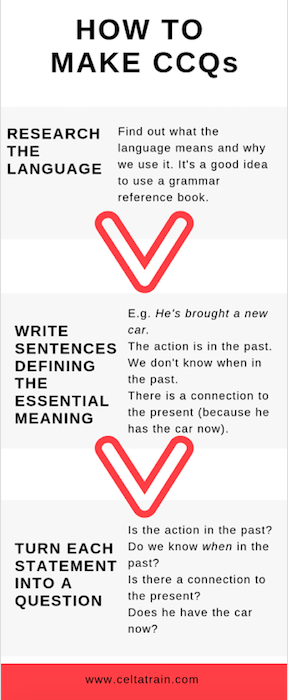In part one, (see here), we established that when teaching, we may need to check students’ understanding of two main areas; instructions and language, and we explored why asking ‘Do you understand?’ is not a good way to check either of these things. Previously we discussed ICQs, (instruction Checking Questions), and now we are going to look at CCQs (Concept Checking Questions). There is some discussion in the ESL / EFL community at present as to the usefulness of CCQs. However, having a range of techniques at your disposal can only be a good thing. Whether you use them or not is up to you – but it’s always helpful to have the choice available and to be able to make an informed decision.
Concept Checking Questions – what are they and when should we use them?
The name pretty much tells us what they are! They are questions which check whether students have understood the meaning / concept / usage of what you are teaching them, and to what extent.
When presenting language, it’s important that we use CCQs after we have conveyed meaning. We can’t usually check understanding of something we haven’t yet taught. Let’s imagine that I am teaching a set of words. One way of dealing with meaning, could be to have students match the words with definitions or pictures. Another way might be for the teacher to show pictures and ask for, (elicit), the word/s. In both cases, students will try to give the word and after they have tried, and the correct answer has been established, there may be things we want to check.
Do we have to check every element of every piece of language we teach?
No – we need to use our judgement. If we look at the example above, it might be that when monitoring, the teacher can see that no one in the class had a problem with meaning for some of the words; as they got the task right, and both in pair-checking and during feedback, the teacher could hear and see that they understood. So, logically, here the teacher doesn’t need to waste time doing lots of checking of these words. However, perhaps for other words in the set, there was more discussion; some students got the answer wrong or the teacher could hear and see that there was some confusion. In this case, it would make sense to further check understanding. Similarly, if the teacher is trying to elicit a word from the class and one of two students can give the answer, it may not mean that the whole class understands, so some checking would be appropriate.
 Criteria for helpful CCQs
Criteria for helpful CCQs
So, now the students have had the word or the structure presented to them, but we feel like they would benefit from some CCQs. What kind of questions are helpful? Look at the CCQs below for a grammatical structure, and decide if you think each one would further clarify the language, and whether the question is helpful. In other words, which do you think are good CCQs, which aren’t, and why?
Target language – present perfect simple
Example sentence – He’s bought a new car.
CCQs
- Has he bought a new car? (yes)
- Is this about the past? (yes)
- Is the car new or old? (new)
- Do we know when in the past he bought the car? (no)
- Is the action connected to the present? (Yes) What does he have now? (a new car)
- Did he complete the purchase of an automobile in the past? (Yes)
- What does ‘He has bought…’ mean?
Now see if you agree with my answers and reasons:
- Not good – we can answer this question and still have no understanding of what the sentence means grammatically. When clarifying and checking grammatical structures, we can’t use the target language. So, in this case, we can’t use the present perfect simple to try and check understanding of the present perfect simple!
- Good – this focuses on an essential part of the meaning of the tense.
- Not good – here the question focuses on something which is not related to the meaning of the tense, but to an irrelevant piece of information (old / new).
- Good – we need to ask this question to make sure students know the difference between the past simple (He bought a car) and the present perfect simple (He has bought a car).
- Good – these questions continue to ask about the central meaning and reason we use this tense.
- Not good – although the question focuses on the right kind of thing, the use of higher level words could be distracting and possibly even prevent students from understanding the question.
- Not good – in general, asking ‘What does…mean?’ is not helpful – as teachers, it is often challenging for us to give clear and concise clarifications or definitions, even if we have had time to plan; so imagine how difficult it could be for our students to come up with these on the spot. Even if students do actually know the meaning of the language, they may lack the ability to articulate it – leading the teacher to think they haven’t understood and which cause them to launch into unnecessary explanation that students didn’t really need.

In summary / top tips
- Try to anticipate problems with language so you can focus CCQs on what is likely to really need checking.
- Write CCQs ahead of the lesson where possible – it can be challenging to make good ones without planning them.
- Don’t ask too many on one point – usually around 3 is enough, more than this can be counterproductive, especially if the questions check the same thing several times. Students may become bored or begin to think none of the questions have benefit.
- Make them clear and concise and use language that is at or below level.
- Unambiguous and closed questions are usually the most helpful.
- Give students time to think rather than immediately answering CCQs yourself.
- It’s possible to give students CCQs on handouts and have them discuss in groups – this gives them thinking time.
- Questions should fully check the central meaning and not focus on other things in the sentence.
- You can often use the target language when checking vocabulary, but don’t do that when checking grammatical structures.
It is also important to recognise that CCQs aren’t the only way to check meaning, and we will be looking at some other techniques in future posts. But for now – experiment with CCQs and see when and how they can help you and your students!
